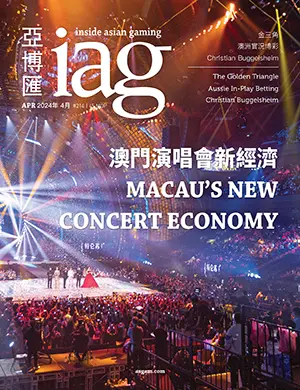Michael Zhu, SVP of International Planning and Analysis for The Innovation Group, delves into the benefits that Chinese President Xi Jinping’s “One Belt and One Road” initiative will bring to Asia’s gaming industry.
PRIOR to the current recovery of Macau’s gaming malaise, stakeholders in the Asian gaming industry often heard that China’s anti-corruption campaign, which began in the fall of 2012, was one of the primary factors attributed to the substantial decline of gross gaming revenue in Macau (as well as the surrounding regions).
In contrast, there is another initiative, proposed and supported by the same regime, that appears not to have attracted as many headlines but could have meaningful implications regarding the outlook of Asian gaming development and progress.
THE “ONE BELT AND ONE ROAD” INITIATIVE
On 7 September 2013, during his state visit to Kazakhstan, Chinese President Xi Jinping delivered a speech at Nazarbayev University declaring China and the Central Asian countries should build an economic “belt” along the historical Silk Road, a trans-Eurasian project spanning from the Pacific Ocean to the Baltic Sea. About one month later, on 3 October 2013, President Xi proposed a new “21st century Maritime Silk Road” in his speech at the Indonesian Parliament during his state visit to the country.
The Silk Road Economic Belt and the 21st century Maritime Silk Road Initiative, also known as the One Belt and One Road Initiative, has since become one of China’s most profound state development strategies that focuses on connectivity and cooperation in order to realize massive trade potential and boost economic development among countries through Central Asia to the Middle East, as well as those along the maritime route through Southeast Asia, the Persian Gulf and the Horn of Africa. At a more personal level, the initiative is also an integral part of President Xi’s efforts on his own blueprint for China’s “great rejuvenation” in the new century
BENEFITS TO THE GAMING INDUSTRY
One of the initiative’s primary priorities is to expand the scale of tourism and to enhance its cooperation/interaction with other relevant industries. As witnessed and still ongoing worldwide, the gaming industry has had a wide variety of effects on boosting tourism by acting as a key catalyst for marketing purposes, creating new attraction factors, providing world-class leisure and entertainment facilities and enhancing the quality of hospitality services as well as guest experience.
The availability of gaming facilities has not only fueled the tourism sector to grow and expand rapidly, but has also greatly benefited the gaming industry itself via infrastructure improvements, such as higher airlift capacity, better road systems and more solid economic fundamentals. For example, Asia now boasts a better educated and skilled workforce and higher spending powers within the region. Therefore, there exist a unique interdependence and mutual benefit between these two sectors.
Countries along the Belt and Road have their own resource advantages with unique natural, cultural and ethnic elements. When these elements are offered together with gaming and leisure facilities, they will be able to compose a strongly exotic attraction factor that well caters to today’s Asian (and global) middle-class travelers, especially the outbound Chinese tourists.
What is more important is the fact that growth in either sector leads to more growth in other sectors via additional jobs, incremental foreign investments, higher tax revenues, increased trade volumes of goods and so on, especially in those less developed countries along the Belt and the Road. As casinos and gaming are increasingly becoming legalized in more countries along the routes, it bodes well for expansion of the tourism sector and more gaming establishments in the future.
The initiative has another priority on transport infrastructure construction and improvement projects, which we believe is going to benefit the gaming industry in the long term. Such improvements as massive ground transportation networks (including China’s signature high-speed railways), coordinated connectivity of customs clearance and comprehensive civil aviation cooperation and improvement are going to resolve, or at least alleviate at a minimum, many bottleneck issues for the existing and prospective casino resort properties so that they can provide more guests with better travel experience and realize higher operating efficiency. On the guest front, this would mean less time and hassle on the road, which translates to longer stays, higher frequency of visits and perhaps higher spend for each visit.
Furthermore, China’s direct investments, from both private and government-driven sectors, to the countries on agriculture, forestry, fishery and sophisticated industries such as energy, information technology, machinery manufacturing, ocean engineering and marine bio-pharmacy, are expected to establish a sizable and consistent volume of business travelers through the economic corridors. Additionally, these business activities are going to generate a substantial demand for conferences and exhibitions. International forums and exhibitions at regional and sub-regional levels are expected to be hosted by countries along the Belt and Road, allowing for potential opportunities to develop more business-oriented meetings, incentives, conferencing and exhibitions (MICE) facilities and other supportive amenities to embrace a full-range integrated resort (IR) model.
WHAT HAS BEEN HAPPENING?
In light of the initiative, a cursory review of what the Asian gaming stakeholders have been doing in the past year or two reveals some pioneering progress along the Belt and the Road.
Along the Belt, in the Almaty region of Kazakhstan where the Chinese government has provided funds for construction of a new international airport, the Tengri Resort is being developed to contain hotels, residences, casinos, other leisure amenities and even educational and medical facilities, with involvement from several Asian gaming stakeholders.
In Russia, other than the Tigre de Cristal Resort and the ongoing construction of a casino resort by NagaCorp Ltd in the Primorye Integrated Entertainment Zone (IEZ) near Vladivostok in the Far East region, the approved establishment of gambling zones in Crimea and Sochi remains on the radar of numerous gaming companies.
As the Belt reaches into Europe, Galaxy Entertainment Group Ltd has acquired a stake in the casino firm Société des Bains de Mer (SBM) that operates four casinos and several hotel properties in the Monaco principality, including Casino de Monte- Carlo. Far East Consortium International, a Hong Kong-listed public firm, recently announced that it is in the process of acquiring Trans World Corporation, a company that currently owns and operates three casinos and five hotels in Germany, Austria and the Czech Republic.
In fact, it is a common point of view shared by many industry experts that these opportunities should allow Asian gaming companies to capitalize on the patronage and reach of over 1,000 casinos in the European Casino Association. Although many of them are very small by comparison to their counterparts in Asia, they are in locations and settings that are ideal for creating unique and exotic experiences which are critical to attract some of the millions of tourists currently travelling from China.
Along the Road there are bustling market dynamics in Korea, the Philippines, Vietnam and Cambodia, with a high level of variety both in project type and in scope. Development efforts for Melco Resorts’ City of Dreams Mediterranean are running at full speed, and some intriguing opportunities in Greece have surfaced as well. In consideration of Kerzner International’s extensive relationships with Chinese business partners, it would not surprise to see more footprints of Asian gaming developers and promoters in South Africa’s current and prospective casinos.
Even for Macau, with its role as a natural bridge between China, Portugal and other Portuguese-speaking countries, the crossregional cooperation initiative is believed to help the tourism sector flourish, diversify the economy and convert Macau into a true world tourism and leisure center.
RESHAPING ASIAN GAMING
With its profound impacts and long-term outcomes, we believe the “One Belt, One Road” initiative has been paving the way for the Asian gaming industry’s next stage of development. The associated trends and changes are going to re-establish the norms and reshape the gaming industry, both in the region and globally, boding well for a brighter future for the industry and its stakeholders.



























